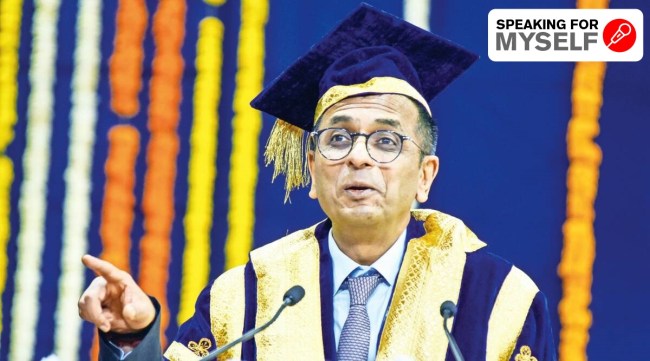Opinion A student writes: The CJI is right to talk about ‘institutions of empathy’. We need to highlight caste-based discrimination in education
As a first-generation student from a marginalised group, I believe that the allyship of those from the forward caste communities who talk about caste discrimination should be measured through their actions
 Chief Justice of India Justice DY Chandrachud made the remarks while speaking at NALSAR University of Law, in Hyderabad. (Photo: PTI)
Chief Justice of India Justice DY Chandrachud made the remarks while speaking at NALSAR University of Law, in Hyderabad. (Photo: PTI) On February 12, Darshan Solanki, a Dalit student at IIT Bombay, died by suicide — allegedly as a result of facing caste discrimination at the institution. Unfortunately, his death will probably become just another number in the data maintained for suicides. But reducing this loss to a mere statistic is a disservice to the student’s memory. In a speech last week, Chief Justice of India D Y Chandrachud quoted educationist Sukhadeo Thorat to argue that if a significant proportion of students who have died by suicide are Dalits and Adivasis, “then it shows a pattern we must question”. He said, “When students leave their home, it becomes the responsibility of educational institutions to establish a bond of institutional friendship with them. Excellence cannot go without empathy.” He said there is too much focus on “institutions of eminence” instead of “institutions of empathy”.
While the CJI’s statement could be seen as a step forward in the conversation about caste-based discrimination in educational institutions, one might question whether it is likely to create a significant positive impact on the lives of students from marginalised groups. Caste discrimination is ubiquitous in our daily lives. Even today, far too many learned individuals harbour feelings of resentment against students from marginalised communities, often describing them as “lacking merit”. This is irrespective of whether these students have benefited from reservations in education since the assumption is that any success they have is due to affirmative action policies. The blame for the small number of seats available in educational institutions is placed on students from marginalised communities, rather than the responsible policymakers. We are all too familiar with anti-reservation posts flooding the internet during the time of admissions but seldom do we see people raising concerns about the growing privatisation of education, which collectively decreases all students’ chances of getting a coveted seat.
Ideally, our forward caste peers should be agitating with us for accessible and affordable public education, something that B R Ambedkar himself had argued for, way back in 1927. Instead, any blame for the fall in the quality of education and for the lack of development of institutions is put squarely on affirmative action policies. This ultimately targets students availing these constitutionally-guaranteed rights. This narrative ends up discouraging students from lower castes who place their faith in institutions to protect them from prejudice. Meanwhile, policymakers are not questioned about the lack of accessible and affordable public education. Instead of criticising reservations, there must be a greater focus on mitigating caste-based discrimination.
As a first-generation student from a marginalised group, I believe that the allyship of those from the forward caste communities who talk about caste discrimination should be measured through their actions. It is not necessary to elevate the CJI to a leading figure against caste discrimination, rather he is an ally to those from within the communities who actively work for the emancipation of all oppressed communities. The CJI, in his capacity, could try and platform people from marginalised groups who, despite strenuous efforts, are unable to reach where he is — owing to structural inequalities. The recent anti-caste law passed in the US city of Seattle offers hope and, perhaps, even a guiding path as to how anti-caste allies can extend their support. Back home, we can envision a successful anti-caste movement only if those who consider themselves allies are willing to amplify and assist agitators from within marginalised communities.
The writer is an undergraduate student of sociology






